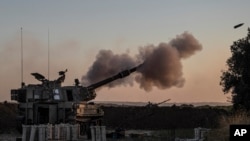Despite multiple attempts by regional and international parties to bring about a cease-fire, violence between Israel and Palestinian militants in the Gaza Strip persisted Wednesday with Israeli airstrikes in Gaza City and militant cross-border rocket fire.
“We are engaged right now in forceful deterrence,” Israeli Prime Minister Benjamin Netanyahu told foreign diplomats Wednesday as he sought to rally support.
Since the fighting began on May 10, Israeli strikes have killed at least 217 Palestinians, including at least 63 children and 35 women, according to Gaza’s Health Ministry. Militant rocket attacks have killed at least 12 Israelis, including a 6-year-old child.
Netanyahu also pushed back against criticism of the Israeli air campaign, saying his forces are doing their best to avoid civilian casualties. He said Israeli forces try to use “great precision” to respond to attacks, but that they cannot prevent all collateral damage.
A group of U.N. human rights experts said in a statement Tuesday that Israel’s aerial attacks in heavily populated areas of Gaza “constitute indiscriminate and disproportionate attacks against civilians and civilian property.” The rights experts also faulted the Palestinian militants for “deliberately or recklessly” firing rockets into Israel, and said the actions of both sides could amount to war crimes.
U.N. Secretary-General Antonio Guterres said in a tweet Tuesday there is “immense human suffering and extensive damage to homes and vital infrastructure in Gaza,” and called on the international community to fund U.N. humanitarian programs in the Palestinian enclave.
France has proposed a U.N. Security Council resolution, in coordination with Egypt and Jordan, calling for a halt to the fighting.
"The three countries agreed on three simple elements: The shooting must stop, the time has come for a cease-fire and the UN Security Council must take up the issue," French President Emmanuel Macron’s office said. Macron spoke Tuesday with Egyptian President Abdel Fattah el-Sissi and Jordan’s King Abdullah II.
The United States, an Israeli ally that has veto power as one of the five permanent members of the council, has so far blocked the council from issuing a statement supporting a cease-fire. U.S. officials have said such a statement would not help diplomatic efforts to end the conflict.
"Our goal is to get to the end of this conflict. We are going to evaluate day by day what the right approach is. It continues to be that quiet, intensive behind-the-scenes discussions are tactically our approach at this point," White House press secretary Jen Psaki told reporters on Tuesday.
The United Nations said it has been “actively involved” in mediation efforts to try to end the violence. In the meantime, the United Nations said it was able to send dozens of fuel trucks but no other assistance from its relief agency into Gaza.
Netanyahu, in a video message released Tuesday, said Israel dealt “unexpected blows” to Hamas and set the militant group “back many years.” He said Israel’s response to the militant attacks serves as a lesson to Israel’s enemies.
Hamas began firing rockets eight days ago in retaliation for what it said were Israeli rights abuses against Palestinians in Jerusalem. Palestinians in the Israeli-occupied West Bank and Israel's 21% Arab minority staged a general strike on Tuesday in solidarity with Gaza.








